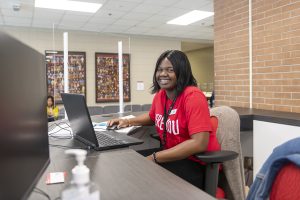1.5 Connecting with the People
Video: Here for You
Video: “Fanshawe Student Success – Here For You” By Fanshawe College [0:34] Transcript Available.
Who Can Help?

Fanshawe College has a diverse network of supports to help you during your time at Fanshawe and beyond. Sometimes identifying the right person or the right resource can be challenging and if you are under stress, it can be even harder.
Throughout this book, look for videos and contact information that will help you identify important resources who are here to support you.
Key Contacts
- Professors/Faculty
- Academic Advisor
- Career and Employment Services
- Financial Aid
- Fanshawe Library Learning Commons: Peer Tutoring

“The first decision I made was connection with colleagues/course mates and my professors as soon as we had our first class because I knew that the connection would make it easy for me and it would help me cope with the stress of having to deal with emotions, loneliness, and pressures alone, especially for we international students. From the class schedule I organized myself and familiarize myself with the easiest route to my class and I did not miss classes or due date for assignments or test. If you cannot help missing a class, always let your professor know you would not be in class. Our professors are nice people, and they know life happen to different people at any time. Another important consideration is that I set target for each course and with my clique of friends and we made sure each of us is accountable and motivated each other in areas where we are weak. I also visited the international centre, career and employment services. They helped me with my resume (aligning it to the Canadian standard) so it better positions me for getting a good job and also gave me some links to check out for part time jobs. Lastly, they help me with my LinkedIn profile (It looks more professional now). The extra effort you make to make these connections will enrich your experience and help you be successful.”
Adedayo Adesile: Fanshawe College, 2023
You may have heard the saying “a problem shared is a problem halved” but the problem shared does not get halved until it is shared with the right person, at the right time.
For now, let’s focus on your most important contacts in your first few weeks. During the term, you will continue to grow your list of contacts.
Your professors and your academic advisor are the most important people to get to know.
How Do I Contact my Professors?
Your Professor is always the expert on what is expected from you in your class work.
- Going to class allows you to ask questions, share ideas with others, and build your peer and professor network! However, if you are learning online or have questions after class time, your professor should be your first point of contact. This will mean learning how to effectively use your Fanshawe Online email to ask good questions, and regularly checking your email to get answers.
Fanshawe Online Correspondence
Your Fanshawe Online email account will be the way your professor communicates with you. All email must include:
Course Code and Section Number
- When you email from within the course, some information will automatically be inserted in the subject for you – you may have to delete some information if it includes more than YOUR section number. Course code and section number can be found on your timetable on Webadvisor.
A subject line that describes the content of your e-mail
- This helps the reader and sender organize and prioritize emails being sent and received (i.e.. ANAT1002-03 W23 Assignment #2 question about format).
A salutation
- If you are not sure how to spell your professor’s name, use Dear Professor. Do not use casual language like “Hey” or “Hello Dear”.
Include a closing and sign your emails
- Set up an automatic signature in Outlook that will display your preferred name, student number, and program information. In the workplace you would include your name, title, company name, and contact information.
- If you are expecting a response to your email, include something like, “I look forward to hearing from you,”
Be brief, clear and always be professional. Use proper case, sentence structure, and grammar
- People have short attention spans so keep it short and separate or number items in your email if you need a response or are responding to more than one thing. This will help ensure nothing gets missed and saves back and forth emails.
While you may have friends at Fanshawe who have taken the same course or program as you, they are not the one who will be grading your work. Regular, professional communication with your professor will be important.
How Do I Contact My Academic Advisor?
Your Academic Advisor supports your journey through the Fanshawe College system.
- They are the experts when it comes to providing advice on dropping a course, your schedule, changing programs, how to communicate with your professors and can connect you with people to help you with your job search, questions about international visa, work permits, parking, security etc.
- Identifying your academic advisor and reaching out for help will demonstrate your commitment to your success
Video: Fanshawe’s Academic Advisors
Questions About: assignments, quizzes, due dates, group work, missed classes, etc.
Questions about schedules, co-op, dropping a course, changing programs, fees, counselling, peer tutor, etc.
How to be Successful Going Forward
- Make a list of all your professors, office hours they are available to connect and how to contact them. This information should be on your course page for each class.
- Use the link at the end of this chapter, identify YOUR academic advisor for YOUR program and their email address. Check their online booking portal to see how to book an appointment.
- If you are on campus, review the map of Fanshawe College to see where you can find your classrooms and other important places, or if you are an online student, identify your professors’ office hours.
- Check your Fanshawe Online email and look up how to create an auto signature.
- Check review the elements of your course sites for all classes so you can identify your classmates and their email addresses (Go to Communications – Classlist).
Video: Community and Connection – Fanshawe Institute of Indigenous Learning
Video: Community and Connection by Fanshawe Institute of Indigenous Learning [11:17] Transcript Available.
” 1.4 Connecting with the People” from Fanshawe SOAR by Kristen Cavanagh is licensed under a Creative Commons Attribution-NonCommercial-ShareAlike 4.0 International License, except where otherwise noted.

